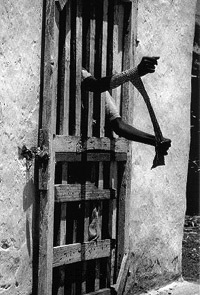The estimations were very critical, starting from the first sentence.
“Armenia is a large source for trafficking of Armenian women and girls, primarily for the United Emirates, Turkey and sometimes even final destination countries.”
The last three words of the sentence mean to say that there are people living like slaves in Armenia too, particularly women and girls.
“It’s amazing to see slavery in the 21st century when we thought that it was abolished. Slavery hasn’t been abolished, it’s simply a little different now,” said John L. Miller, ambassador and director of the office monitoring and fighting against trafficking during a teleconference held at the U.S. Embassy. Miller is also the elder adviser to U.S. Secretary of State Condaleza Rice on trafficking issues.
Journalists wanted to know what “large source” meant and what the standards are for deciding whether it’s big or not.
“If you read our report, you will see that many countries are described as “large”, including the U.S. It’s not about the low or high levels of trafficking. It’s about what is being done to get rid of trafficking,” said Miller and stated that, based on their data, nearly 2000 Armenian women are involved in trafficking.
The Armenian government has low marks for its activities in the report, however, the report does state abstractly that there is some progress.
“The Armenian government doesn’t meet the minimum standards for eliminating trafficking, however it is completing significant work in making that a reality,” as stated in the report.
There are some accusations for Armenia in the report.
“The government hasn’t followed up on the accusations of the state officials involved in trafficking and hasn’t persecuted them.”
Mr. Miller emphasized the part in the report, stating the fact that one of the officials of the anti-trafficking division of the chief prosecutor’s office had been accused of corruption. The government had even formed a special group to conduct research on this, but as stated in the report:
“After shallow investigation, the group came to the conclusion that there isn’t enough evidence.”
“We’re familiar with that case, but we are not competent to conduct our own investigation. But I would like to say that Armenian society is of the opinion that the legal system in Armenia is corrupt, and that has a negative influence on the fight against trafficking,” said J. Miller.
Where does the U.S. State Department get such information? It turns out that the department’s main source is the press, which the authorities don’t care about.
Does the organization headed by John Miller have any concrete facts about the state officials? If the government wants to punish the people involved in trafficking, will that organization help by announcing the names?
“It would be better to ask my colleagues working at the U.S. Embassy in Armenia…We inform the U.S. Embassy as soon as we get any information,” said Mr. Miller.
Diplomatic etiquette didn’t allow him to be more sincere, otherwise he could have said that the Armenian government knows the names of those state officials better than he does.
The U.S. State Department has classified Armenia as member of the second group of countries, the so-called “special superintendence list”. Although John Miller said that he didn’t want to draw comparisons between countries, however upon the request of journalists, he said that Azerbaijan was one step ahead of Armenia and has been removed from the “superintendence list”.
According to the U.S. State Department, Azerbaijan’s level of defense and support for victims of trafficking is higher than Armenia’s. It’s a shame to admit it, but it turns out that Azerbaijani are more prepared to defend and help women if necessary. Georgia is not doing bad either, being a transitional country.
Miller said nothing about the penalties if Armenia doesn’t take the steps against this. Instead, he talked about the steps being taken for the third group countries.
“If the given country is placed in the third group based on the June report, then it is given three months and if there are no changes within three months, there may be some penalties. For example, the given country could be forbidden to receive help from the U.S. such as strategic aid. In addition, the U.S. will not go along with the proposals of the given country’s government working with the World Bank or cooperation with other international organizations,” said John Miller. He hopes that Armenia will not only be out of the third group, but also removed from the “superintendence” list.
According to Miller, during the past couple of years, “Armenia has received more than 600,000 dollars from American taxpayers” in order to take more effective steps towards fighting against trafficking.
But there are no effective results; no state official suspected of trafficking has been revealed. Although John Miller tries to encourage us and says that there is progress in Armenia, however the report states the opposite.
“The profit gained from trafficking of victims has gone up compared to last year.”
Unfortunately, it doesn’t state whether that number is a two-digit or one.

